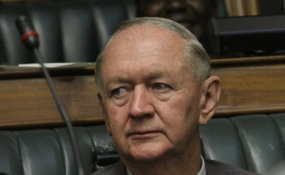Zimbabwe has firm macro-economic fundamentals, notwithstanding current challenges, and the introduction of a new currency will further enhance stability, according to economist Mr Eddie Cross.
Macro-economic fundamentals focus on issues that concern an economy at large, including supply and demand and growth, as well as considerations for monetary or fiscal policy and international trade.
“The underlying economy actually is fine, it’s growing, exports are growing and the fundamentals are strong and this was reflected by the fact that by Christmas the rate to the RTGS (Real Time Gross Settlement) dollar had come down to 2,83.

“Now at 2,83 everybody has got to understand that the bond note is the strongest currency in the SADC region, because it is a currency, and this indicates the underlying strength of the Zimbabwe economy despite the problems,” said Mr Cross, who is also a founding member of opposition Movement for Democratic Change.
Speaking to the Zimbabwe Broadcasting Corporation (ZBC) on Monday, Mr Cross said the strong macro-economic fundamentals should start reflecting in a couple of months, adding that the proposed introduction of a new currency will further enhance stability. Finance and Economic Development Minister Professor Mthuli Ncube is on record as saying that Government is implementing a cocktail of measures that include enforcing fiscal discipline, cutting runaway Government expenditure as well as increasing compliance on the revenue collection front to create an enabling environment for the reintroduction of a local currency.
Said Mr Cross: “We are going to be in a very different situation by the end of March. But I think we will see a return to stable market conditions and stable trading conditions about June or July and that will coincide with the introduction of a new currency by the Government.
“I think (the introduction of a new currency) is sensible. It will end the queues at the banks, it will give people access to their bank balances and it will allow us to issue a currency, which can be used for local trading but without the mistakes that we made in the past with the Zimbabwe dollar where the Governor of the Reserve Bank (of Zimbabwe Dr Gideon Gono) printed money to cover the fiscal deficit. In economic terms you can’t do that because if you do that you destroy the value of the currency.”
The announcement of the Monetary Policy Statement by Reserve Bank of Zimbabwe Governor Dr John Mangudya, largely expected any time from now, should provide further impetus for the introduction of a new local currency.
Minister Ncube is also on record as saying Government will introduce a local currency within 12 months starting January.
“The first step was separation of the FCA accounts, and now you can trade with nostro FCAs until you get to a full domestic currency situation.







